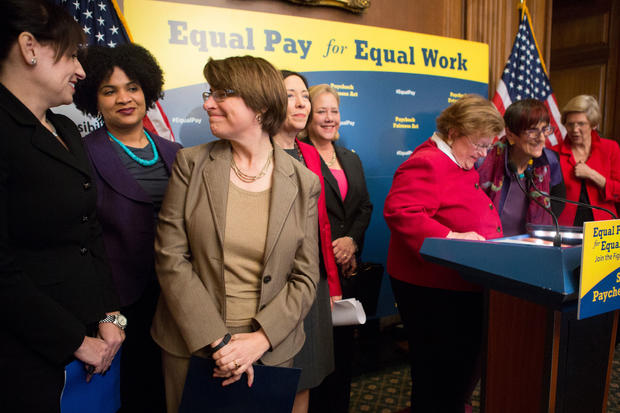Why women’s pay gap means trouble later in life
Fear of becoming an old bag lady is apparently fairly common, even for high-income female workers. It turns out it might not be such an ungrounded worry.
Women are hitting retirement age with lower Social Security benefits than men, as well as less in private savings and less pension income than their male counterparts, according to a new report issued by Sen. Amy Klobuchar, D.-Minn., who serves as vice chair of the U.S. Congress Joint Economic Committee.
So what's the solution? President Obama and Democratic lawmakers are using Equal Pay Day to champion a host of legislative remedies. Klobuchar, for one, is promoting the Paycheck Fairness Act, which "would protect women who inquire about pay within their workplace from retaliation," according to her report. Obama, meanwhile, is expected to sign an executive order that would bar federal contractors from punishing employees who discuss their salaries with each other.
Such maneuvers aren't going over well with some. Republicans are calling the push to pass the Paycheck Fairness Act "desperate," while American Enterprise Institute scholars Mark Perry and Andrew Bigg took to The Wall Street Journal to deny that a gender pay gap even exists.
Perry and Biggs point out that part of the pay gap can be explained by women's occupational choices -- female workers tend to work in fields such as child-care or education, which pay less. Men are more likely to take jobs in higher paying tech fields or in riskier, yet more remunerative, jobs such as logging.
Still, the pay gap can't be completely explained away. Even when women enter so-called STEM fields -- science, technology, engineering and math -- their earnings are lower than men's, according to the Association of American Colleges and Universities. Median annual earnings for male computer software engineers is about $89,000, compared with only $77,000 for women in the same profession.
Female teachers, for example, earn 89 percent of what male teachers are paid, the study found.
Still, some of the proposed legislative action may not prove to have much chance of gaining ground. The Paycheck Fairness Act, for instance, has already failed twice.
Klobuchar, however, noted that some earlier legislation promoting equality for women had faced headwinds but eventually succeeded. "It took a long time to get women the right to vote," she noted. But simply having the discussion about these issues is a good way to spark a change, she added.
No matter what solutions are proposed, the fact remains that the retirement years aren't so golden for many women. Thanks to unbalanced pay, women are at greater risk for tumbling into poverty when they reach their retirement years. That's not likely to change anytime soon.
